“As peace talks in Colombia advanced over the past year, 7,000 rebel fighters began slowly emerging from their jungle hideouts hoping for, if not a hero's welcome, at least an outstretched hand from fellow Colombians tired of a half century of bloody combat. But with the peace deal's stunning defeat in a referendum Sunday, the future of the Revolutionary Armed Forces of Colombia's rebels is now in limbo just a few days after they unanimously ratified the accord and began planning a return to civilian life. For now, a return to the battlefield in a war that has already killed 220,000 people and displaced 8 million seems unlikely. Within hours of defeat, FARC leader Rodrigo Londono reaffirmed the group's commitment to peace, saying its only weapon going forward would be the power of its word. On Monday, he said his troops would honor its commitments to the government and stick by a permanent cease-fire. The government has vowed the same and President Juan Manuel Santos quickly dispatched his negotiators to Cuba to try to salvage the accord. He also extended an olive branch to arch-rival former President Alvaro Uribe, inviting the hard-line conservative who led the opposition to the accord to join him in a bid to renegotiate and strengthen it. But the rebels' ambition, enshrined in a 297-page document that would have allowed them to avoid jail time and form a political movement with seats in Congress, is now at risk. As part of the deal, rebels who confess their crimes to special peace tribunals were to be spared prison sentences and instead perform development work in areas hard-hit by the conflict. Colombians overwhelmingly loathe the FARC, who they blame for dozens of crimes from drug-trafficking and the forced recruitment of child soldiers to kidnapping and attacks on civilians. That hatred was only reinforced by Sunday's results”. – The Associated Press
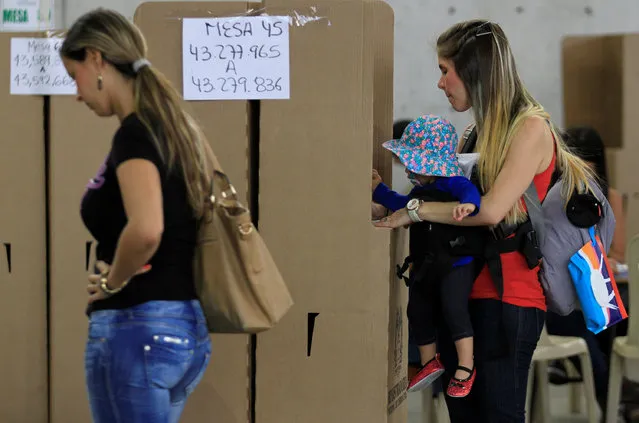
A woman carrying her daughter casts her vote in a referendum on a peace deal between the government and Revolutionary Armed Forces of Colombia (FARC) rebels in Medellin, Colombia, October 2, 2016. (Photo by Fredy Builes/Reuters)
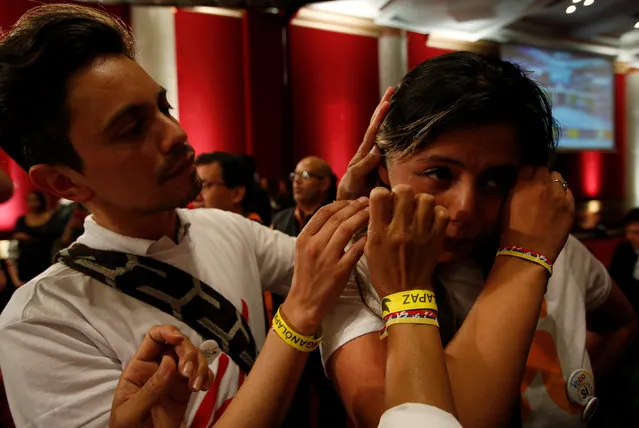
A supporter of “Si” vote cries after the nation voted “NO” in a referendum on a peace deal between the government and Revolutionary Armed Forces of Colombia (FARC) rebels, at Bolivar Square in Bogota, Colombia, October 2, 2016. (Photo by John Vizcaino/Reuters)
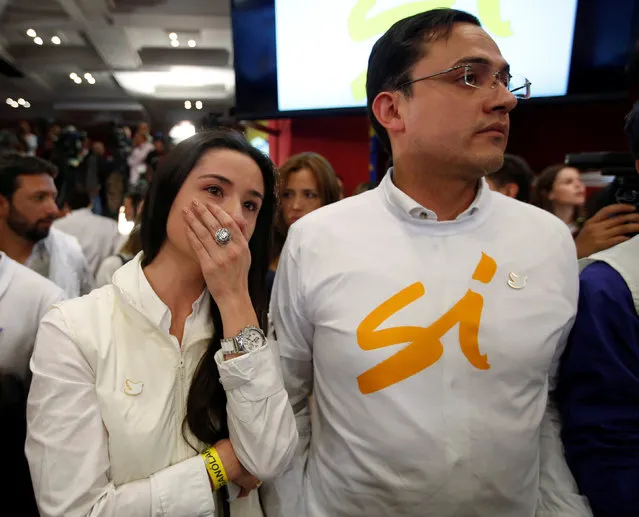
A supporter of “Si” vote cries after the nation voted “NO” in a referendum on a peace deal between the government and Revolutionary Armed Forces of Colombia (FARC) rebels, at Bolivar Square in Bogota, Colombia, October 2, 2016. (Photo by John Vizcaino/Reuters)
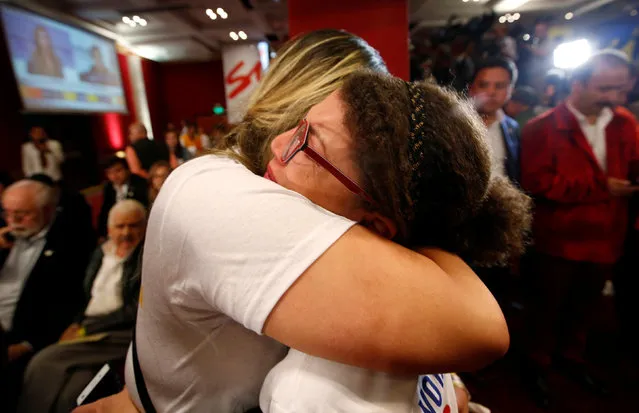
Supporters of “Si” vote cry after the nation voted “NO” in a referendum on a peace deal between the government and Revolutionary Armed Forces of Colombia (FARC) rebels, at Bolivar Square in Bogota, Colombia, October 2, 2016. (Photo by John Vizcaino/Reuters)
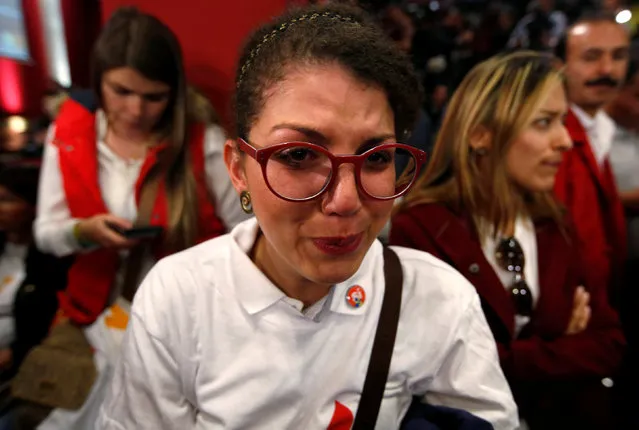
A supporter of “Si” vote cries after the nation voted “NO” in a referendum on a peace deal between the government and Revolutionary Armed Forces of Colombia (FARC) rebels, at Bolivar Square in Bogota, Colombia, October 2, 2016. (Photo by John Vizcaino/Reuters)
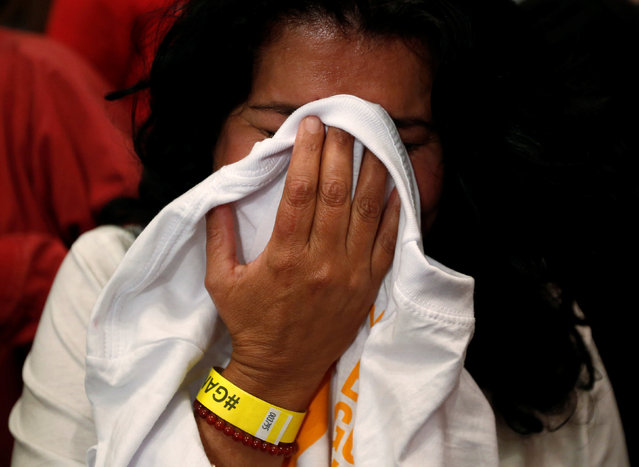
A supporter of “Si” vote cries after the nation voted “NO” in a referendum on a peace deal between the government and Revolutionary Armed Forces of Colombia (FARC) rebels, at Bolivar Square in Bogota, Colombia, October 2, 2016. (Photo by John Vizcaino/Reuters)
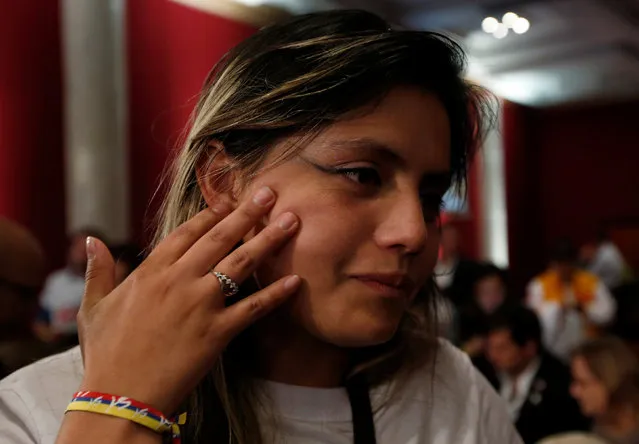
A supporter of “Si” vote cries after the nation voted “NO” in a referendum on a peace deal between the government and Revolutionary Armed Forces of Colombia (FARC) rebels, at Bolivar Square in Bogota, Colombia, October 2, 2016. (Photo by John Vizcaino/Reuters)
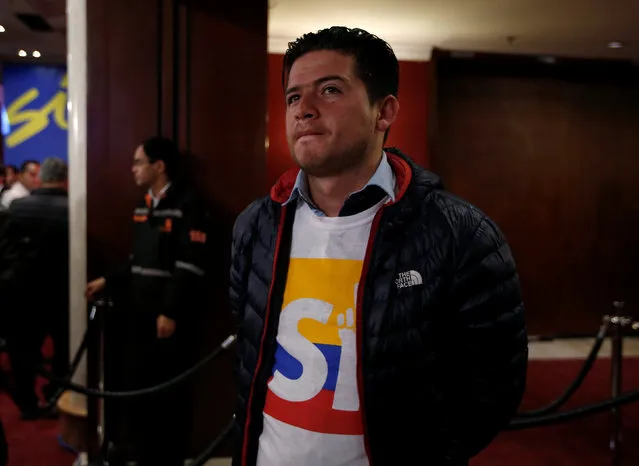
A supporter of “Si” vote reacts after the nation voted “NO” in a referendum on a peace deal between the government and Revolutionary Armed Forces of Colombia (FARC) rebels, at Bolivar Square in Bogota, Colombia, October 2, 2016. (Photo by John Vizcaino/Reuters)
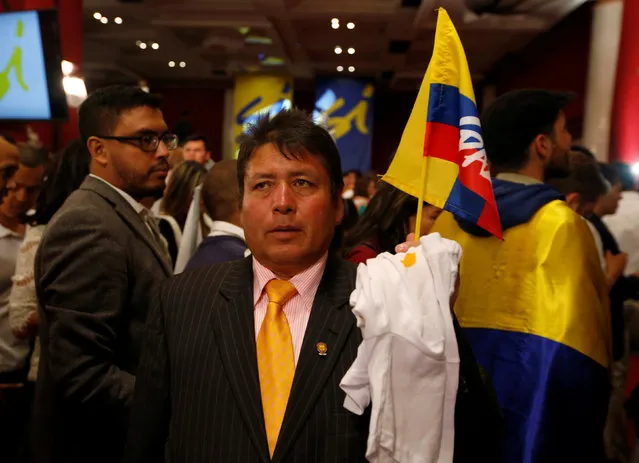
A supporter of “Si” vote reacts after the nation voted “No” in a referendum on a peace deal between the government and Revolutionary Armed Forces of Colombia (FARC) rebels, at Bolivar Square in Bogota, Colombia, October 2, 2016. (Photo by John Vizcaino/Reuters)
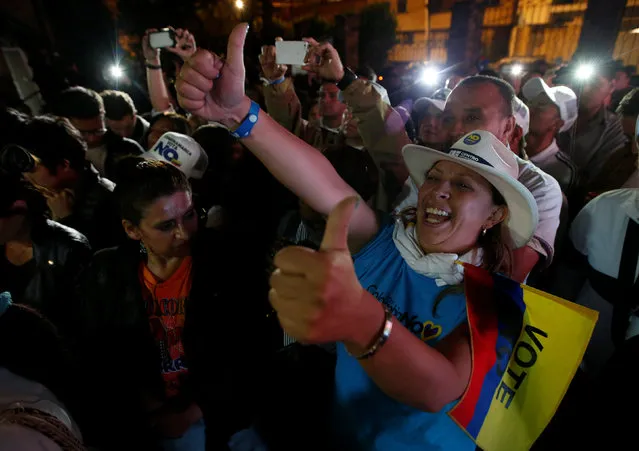
Supporters of “No” vote celebrate after the nation voted “No” in a referendum on a peace deal between the government and Revolutionary Armed Forces of Colombia (FARC) rebels, in Bogota, Colombia, October 2, 2016. (Photo by John Vizcaino/Reuters)
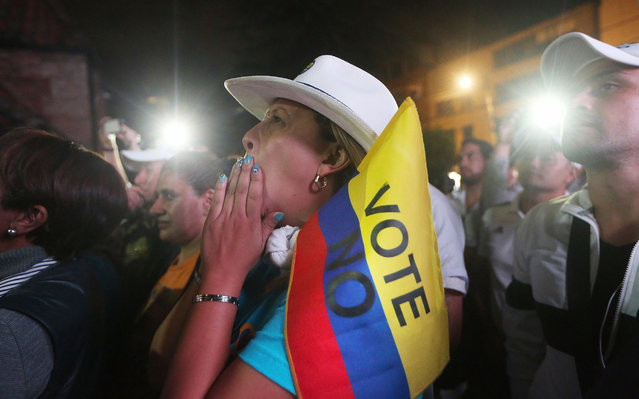
“No” supporters gather at a rally following their victory in the referendum on a peace accord to end the 52-year-old guerrilla war between the FARC and the state on October 2, 2016 in Bogota, Colombia. The guerrilla war is the longest-running armed conflict in the Americas and has left 220,000 dead. The plan called for a disarmament and re-integration of most of the estimated 7,000 FARC fighters. Colombians have voted to reject the peace deal in a very close vote. (Photo by Mario Tama/Getty Images)
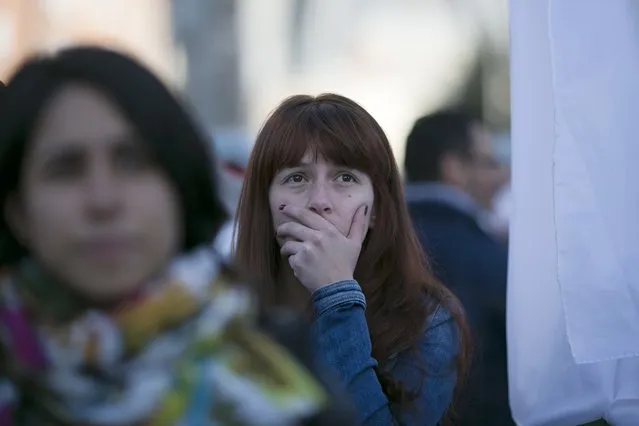
A supporters of the peace accord between the Colombian government and rebels of the Revolutionary Armed Forces of Colombia, FARC, follow on a giant screen the results of a referendum to decide whether or not to support the peace accord in Bogota, Colombia, Sunday, October 2, 2016. The peace deal is expected to end more than 5 decades of conflict between the FARC and the government. (Photo by Ariana Cubillos/AP Photo)
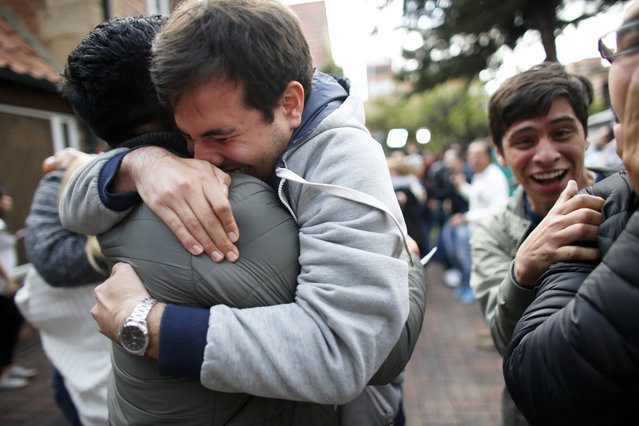
Opponents to the peace deal signed between the Colombian government and rebels of the Revolutionary Armed Forces of Colombia, FARC, celebrate as they listen to the results of the referendum to decide whether or not to support a peace accord to in Bogota, Colombia, Sunday, October 2, 2016. A referendum on Colombia's peace deal with leftist rebels was going far worse than expected for the government Sunday, with those favoring the deal leading by a razor-thin margin with more than half the votes counted. (Photo by Ariana Cubillos/AP Photo)
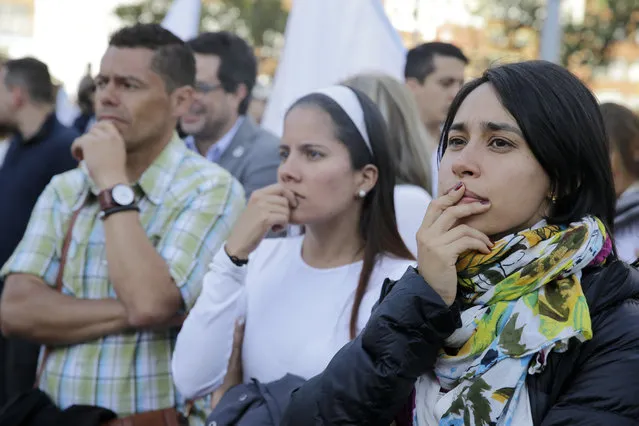
Supporters of the peace accord between the Colombian government and rebels of the Revolutionary Armed Forces of Colombia, FARC, follow on a giant screen the results of a referendum to decide whether or not to support the peace accord in Bogota, Colombia, Sunday, October 2, 2016. The peace deal is expected to end more than 5 decades of conflict between the FARC and the government. (Photo by Ricardo Mazalan/AP Photo)

A woman carrying her daughter casts her vote in a referendum on a peace deal between the government and Revolutionary Armed Forces of Colombia (FARC) rebels in Medellin, Colombia, October 2, 2016. (Photo by Fredy Builes/Reuters)

A supporter of “Si” vote cries after the nation voted “NO” in a referendum on a peace deal between the government and Revolutionary Armed Forces of Colombia (FARC) rebels, at Bolivar Square in Bogota, Colombia, October 2, 2016. (Photo by John Vizcaino/Reuters)

A supporter of “Si” vote cries after the nation voted “NO” in a referendum on a peace deal between the government and Revolutionary Armed Forces of Colombia (FARC) rebels, at Bolivar Square in Bogota, Colombia, October 2, 2016. (Photo by John Vizcaino/Reuters)

Supporters of “Si” vote cry after the nation voted “NO” in a referendum on a peace deal between the government and Revolutionary Armed Forces of Colombia (FARC) rebels, at Bolivar Square in Bogota, Colombia, October 2, 2016. (Photo by John Vizcaino/Reuters)

A supporter of “Si” vote cries after the nation voted “NO” in a referendum on a peace deal between the government and Revolutionary Armed Forces of Colombia (FARC) rebels, at Bolivar Square in Bogota, Colombia, October 2, 2016. (Photo by John Vizcaino/Reuters)

A supporter of “Si” vote cries after the nation voted “NO” in a referendum on a peace deal between the government and Revolutionary Armed Forces of Colombia (FARC) rebels, at Bolivar Square in Bogota, Colombia, October 2, 2016. (Photo by John Vizcaino/Reuters)

A supporter of “Si” vote cries after the nation voted “NO” in a referendum on a peace deal between the government and Revolutionary Armed Forces of Colombia (FARC) rebels, at Bolivar Square in Bogota, Colombia, October 2, 2016. (Photo by John Vizcaino/Reuters)

A supporter of “Si” vote reacts after the nation voted “NO” in a referendum on a peace deal between the government and Revolutionary Armed Forces of Colombia (FARC) rebels, at Bolivar Square in Bogota, Colombia, October 2, 2016. (Photo by John Vizcaino/Reuters)

A supporter of “Si” vote reacts after the nation voted “No” in a referendum on a peace deal between the government and Revolutionary Armed Forces of Colombia (FARC) rebels, at Bolivar Square in Bogota, Colombia, October 2, 2016. (Photo by John Vizcaino/Reuters)

Supporters of “No” vote celebrate after the nation voted “No” in a referendum on a peace deal between the government and Revolutionary Armed Forces of Colombia (FARC) rebels, in Bogota, Colombia, October 2, 2016. (Photo by John Vizcaino/Reuters)

“No” supporters gather at a rally following their victory in the referendum on a peace accord to end the 52-year-old guerrilla war between the FARC and the state on October 2, 2016 in Bogota, Colombia. The guerrilla war is the longest-running armed conflict in the Americas and has left 220,000 dead. The plan called for a disarmament and re-integration of most of the estimated 7,000 FARC fighters. Colombians have voted to reject the peace deal in a very close vote. (Photo by Mario Tama/Getty Images)

A supporters of the peace accord between the Colombian government and rebels of the Revolutionary Armed Forces of Colombia, FARC, follow on a giant screen the results of a referendum to decide whether or not to support the peace accord in Bogota, Colombia, Sunday, October 2, 2016. The peace deal is expected to end more than 5 decades of conflict between the FARC and the government. (Photo by Ariana Cubillos/AP Photo)

Opponents to the peace deal signed between the Colombian government and rebels of the Revolutionary Armed Forces of Colombia, FARC, celebrate as they listen to the results of the referendum to decide whether or not to support a peace accord to in Bogota, Colombia, Sunday, October 2, 2016. A referendum on Colombia's peace deal with leftist rebels was going far worse than expected for the government Sunday, with those favoring the deal leading by a razor-thin margin with more than half the votes counted. (Photo by Ariana Cubillos/AP Photo)

Supporters of the peace accord between the Colombian government and rebels of the Revolutionary Armed Forces of Colombia, FARC, follow on a giant screen the results of a referendum to decide whether or not to support the peace accord in Bogota, Colombia, Sunday, October 2, 2016. The peace deal is expected to end more than 5 decades of conflict between the FARC and the government. (Photo by Ricardo Mazalan/AP Photo)
04 Oct 2016 10:30:00,
post received
0 comments
